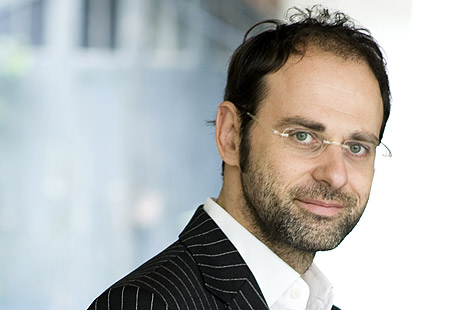Michaël Boumendil
Interview
Note: This interview was conducted in English. We've transcribed our talk here verbatim with only minor edits. We thank Michaël for accommodating "Floydian Slip" by speaking to us in our native language.
(Jingle)
Floydian Slip (FS): That four-note signature was serving its intended purpose for SNCF, the French rail system, when David Gilmour discovered it on his way to Paris. He ended up using it as the starting point for his new track "Rattle That Lock."
The man behind those four notes is Michaël Boumendil from the Paris marketing agency Sixième Son. So tell me how this worked, Michaël: Your phone rings one day, out of the blue, and it's David Gilmour?
Michaël Boumendil (MB): Yeah, I had a message. I have an office in Chicago and then I was back to France. I had a full day of meetings in London. Between two meetings my assistant was sending me some message. One of the messages was saying, "Mr. David Gilmour called and would like you to call him back." I had a number in the UK.
To be honest with you, I thought, "Okay, that might be a joke." People on Facebook must have seen that I was in London for a mobile meeting, so I didn't call back. (Laughs)
Two hours after my assistant sent me another message saying it was the same person, this person wanted to give the information that he is the guitar player and the voice of Pink Floyd.
FS: You recognized the name, David Gilmour.
MB: Yeah, of course. First, you know that many people may be named David Gilmour. As this was this kind of coincidence, I was in London and I said, "It must be a friend of mine." I said, "Maybe if I have time to have a drink with some friend of mine ..." So I called.
FS: What did he say when you got him on the phone?
MB: In fact, when I called back, it was too late so he asked me to call his agent. Then I called his agent and the agent told me about the project.
FS: Did you eventually get David on the phone and speak to him directly?
MB: Frankly, it was so unreal that I just can't remember it, in fact. This story, still, I have to say I was a little bit jet lagged from the fact that I was coming back from the USA, and then on my way to London. In my mind, things were not so clear! (Laughs)
I mainly can't say what was said. I just remember he said, "I cannot talk to you now, but if you want, please call my agent." I have that in mind. Did we talk, long, not long, I don't remember, frankly.
FS: Was there collaboration as far as the songwriting goes, beyond the fact that he was going to use this piece that you had originally done? Why don't you explain to us what this thing is that he based the song on. It's hard to put into words.
MB: I think that it's a kind of an audio brand — an audio signature we've created with Sixième Son, the company I founded 20 years ago. This company is really dedicated to creating audio branding systems. Just like we have branding agencies working out visual identity we do the same thing, but in the field of sound and music.
This piece of music we did for SNCF, the major French railroad. The story of this piece of music is rather simple. It's based on four notes with a very unusual female voice we designed here. It's now in all the train stations around France.
I believe that to a certain extent this is what has seduced David Gilmour, the fact that he told me really these things stand out. It grooves, there's a quality in the texture and the writing that I don't find when I'm listening to everyday life sounds, in the sounds for advertising. Really, he repeated that several times: "Your thing is grooving and it's inspiring."
FS: This was not the first time that somebody asked you to repurpose something that you've created right?
MB: That's right.
FS: This particular piece had been requested many times.
MB: We receive a lot of proposals, I would say, from artists, and sometimes very famous artists. Most of the time I say no. One of the reasons I accepted, I know that David would be tuned to that creation, respectful for that creation, because that was the reason why he wanted to do a song based on that.
I also have to say that knowing the work of David Gilmour I know that he's a person that pays so much attention in the quality of what he is doing, and particularly in the quality of sound.
FS: You started this journey two years ago. Now of course it's become public because the song is out. Are you getting a lot of attention over this?
MB: Yeah and very different attention. You have to put yourself in the shoes of French people that are commuting every day and listening to that tune. They say, "Wow, that is very bizarre because for me it becomes a piece of art, but it's still the sound of my commuting every day."
Then we have the media saying, "Wow that is the first time in the history that it's not a brand taking something out of the work of an artist, it's a major artist that shows that a brand can be inspiring."
FS: When was the first time that you heard the finished song? Did you get a private playing or did you just happen to hear it on BBC2?
MB: No, it was very recently because it was at the moment of the mix when David invited me to his place in London. You know his famous boat ...
FS: Yes, Astoria.
MB: Astoria, yes. It was the moment when I heard the final version. We've been working on the first version. This was the first version that finally convinced me to accept it.
FS: You actually heard an earlier version before you even fully committed to allowing this to happen?
MB: Yeah. I needed it because I wanted to know where it was taking me, finally. Without that it would have been impossible for me to accept.
FS: It's very catchy. Once you get it in your head, you can't get it out.
MB: (Laughs) I know that. You know what is very funny is the fact that most of the sound, and David told something like this at the BBC, most of the sound you can hear on the advertising when you are in an airport or a train station, finally it's annoying. It's something that you don't feel is positive. This one, not only is it catchy, but it tells you a story.
David told me that some elements of this album come from things he has created something like 10 years ago. The way he's used to creating songs that can be five, seven, eight, 10, 12 minutes and told me, "Wow you can say and tell stories in three seconds." I remember when we had lunch together he said, "I should be inspired by the way you do that."
FS: Thank you so much for talking with us.
MB: It was a pleasure. Thank you for inviting me to that conversation.

